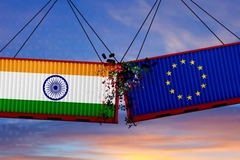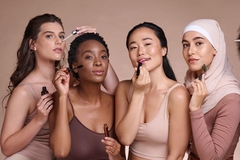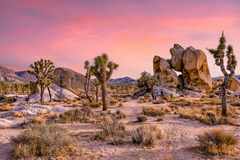Halal cosmetics surges globally: TikTok trends and market boom in Indonesia

09 Jan 2024 --- Halal cosmetic sales are rising thanks to Gen Z preferences, social media and AI advancements.
According to The State of the Global Islamic Economy 2023/24 Report by Salaam Gateway, the beauty industry is returning from the COVID-19 pandemic, where hybrid makeup is trending alongside lipstick due to relaxed mask regulations.
A closer look at Indonesia’s halal cosmetics industry, highlighted by ASEAN Briefing, reveals a market value of US$4.19 billion in 2022, poised for 8% growth in 2023.
“Brands are working toward making their supply chains more resilient and sustainable. AI and AR have emerged as the two hottest technological innovations in the beauty industry, enabling virtual makeup try-ons. Korea is actively working to establish a global network to capture a larger share of the halal cosmetics market. At the same time, India and Indonesia remain the top two largest markets by Muslim consumer spending on cosmetics,” details the report.

“Muslim consumer spending on cosmetics reached US$84 billion in 2022, up by 14.3% from US$74 billion in 2021, and is forecasted to reach US$129 billion by 2027 at a CAGR of 8.9%.”
Further, the report notes that skin-friendly makeup and non-alcoholic perfumes signal opportunities, while venture capital funding for start-ups, Korean cosmetics in MENA and “live commerce” follow closely.
Cosmetics trading
Overall, Salaam Gateway found odoriferous substances had the highest import (30.5%), followed by makeup and skin care (28.2%). “Perfume and toilet water” was imported at 14.9%, hair care at 10.7%, “personal” at 8%, oral care at 4.8% and essential oil at 2.9%.
 Skin-friendly makeup and non-alcoholic perfumes signal opportunities in halal markets.It lists the UAE, Saudi Arabia, Turkey, Malaysia and Indonesia as the top importers of these products. The top exporters were France, Ireland, China, Germany, the US and India.
Skin-friendly makeup and non-alcoholic perfumes signal opportunities in halal markets.It lists the UAE, Saudi Arabia, Turkey, Malaysia and Indonesia as the top importers of these products. The top exporters were France, Ireland, China, Germany, the US and India.
New generation on social media
A new generation of skinintellectuals — well-informed consumers — is exploring specific ingredients, men's makeup and K-beauty.
“Social media platforms like TikTok have raised customer awareness of authentic, clean and halal beauty. They have also impacted the increased adoption of skin care products among men,” outlines the report.
“Global makeup trends in 2022, such as ‘passport makeup,’ ‘red nail theory’ and ‘slugging,’ are powered by TikTok. These trends have also dominated Google’s top trending beauty searches for 2022. Ingredient research is also prevalent on TikTok [as] many users searched for niacinamide, hyaluronic acid and retinol.”
Salaam Gateway reports that Saudi Arabian men are “more open” to cosmetic procedures due to celebrity culture and social media. Product premiumization is a leading trend for men’s skin care, while the Korean wave encourages men to explore skin care brands for better skin health.
Indonesia: Driving forces
According to ASEAN Briefing, the driving force behind Indonesia’s cosmetics boom is its rapidly expanding middle class, estimated at 54 million and projected to reach 135 million by 2030.
 The Indonesian government reduces costs for a more efficient halal certification process. Its beauty industry saw a 5% rise in 2023 and is predicted to rise to 9% by 2026. This is driven by the cosmetics and personal care segment, which had a 14% growth in 2022 and is expected to grow by 4.5% from 2024 to 2027.
The Indonesian government reduces costs for a more efficient halal certification process. Its beauty industry saw a 5% rise in 2023 and is predicted to rise to 9% by 2026. This is driven by the cosmetics and personal care segment, which had a 14% growth in 2022 and is expected to grow by 4.5% from 2024 to 2027.
Further, halal cosmetics, a large part of Indonesia’s beauty landscape, began gaining mainstream prominence around 2014.
Indonesia’s Regulation 39/2021 mandates halal certification for various products, positioning Indonesia as one of the world’s largest halal markets.
This is supported by the findings of Salaam Gateway, which show that Indonesian firms made some of the largest cosmetic deals compared to other countries.
Beyond Muslim consumers, Millennials, Gen Z and non-Muslim demographics are increasingly embracing halal products as they are often organic, natural or vegan, notes ASEAN Briefing.
Indonesia: Complexities and opportunities
ASEAN Briefing finds that the cosmetics industry in Indonesia faces challenges, including the dependence on imported raw materials (90%), primarily from Japan, South Korea and the US, which increases business costs.
Especially with no international halal certification, navigating the verification process becomes complex as businesses have to certify production facilities.
Further, the platform notes competition from local and international players, with Chinese cosmetics posing hurdles. Global giants leverage experience and networks, while local products cater to affordability.
However, ASEAN Briefing suggests foreign investors can capitalize on Indonesia’s cosmetic industry by positioning themselves amidst its vast and growing market. “There are huge opportunities for R&D investments in the upstream cosmetics industry,” adds the platform, commenting on the nation’s biological diversity.
Lastly, the Indonesian government’s initiatives, such as reduced registration fees and expedited processes, facilitate a more efficient halal certification process.
By Venya Patel













